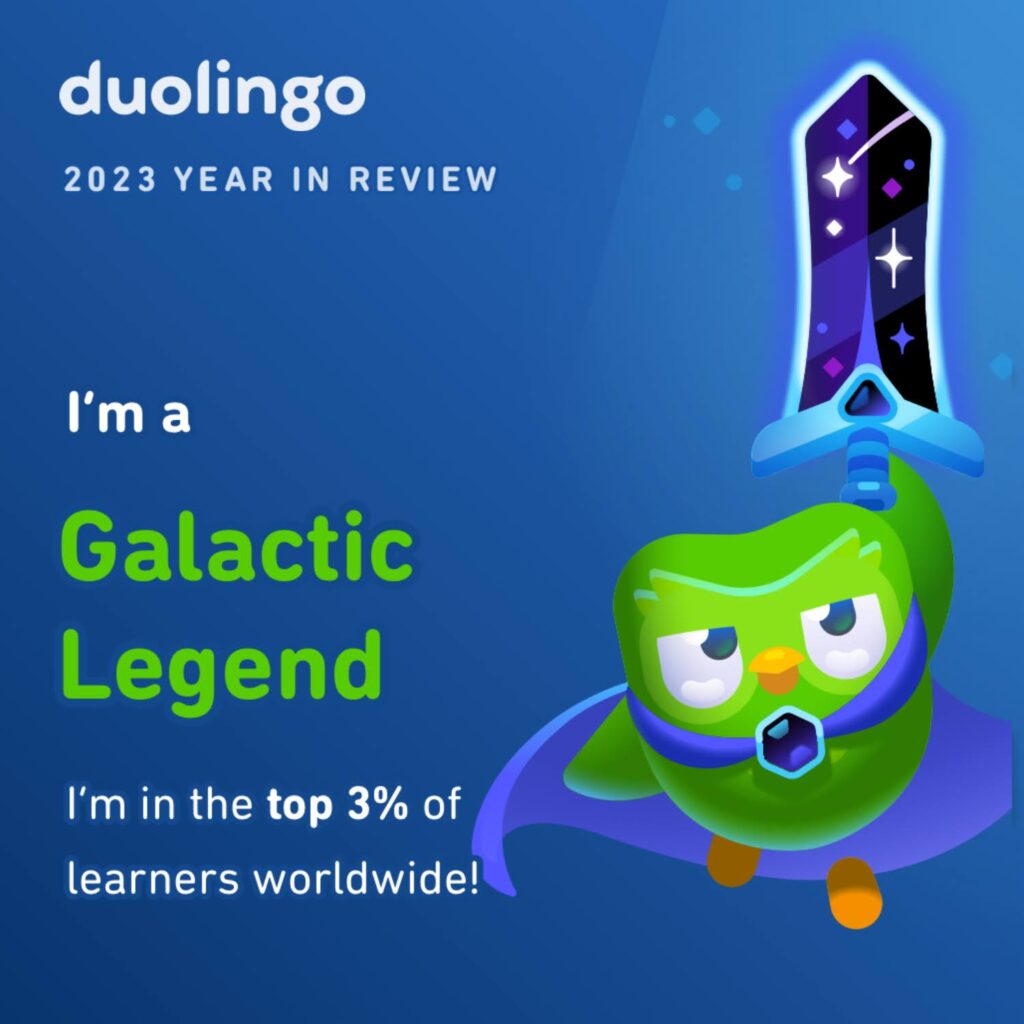
I have the nerve to be mad that the year in review is based on my November 30th progress. HAHAHAHAHAHA.

Hints on how A.E. Graves spends her imaginary spare time

I have the nerve to be mad that the year in review is based on my November 30th progress. HAHAHAHAHAHA.

If you aren’t used to seeing this satire site’s fierce commentary on American Denialism, it devastates because they can use this template SO OFTEN.
The Onion went big for this particular mass shooting, covering their page in reprints of the many times they have needed to use it. For commentary on that, the Guardian has a good recap:
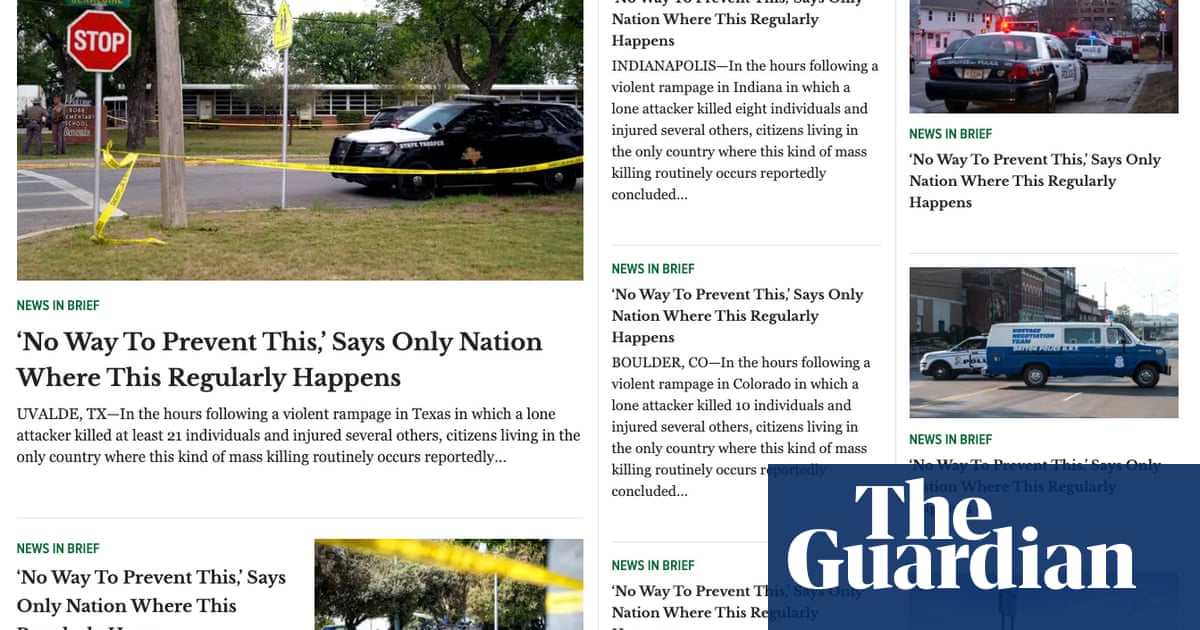
While you may think this dark view and the imagined interviews are an overstatement, I personally have heard young people say that mass murders such as these can’t be prevented and that gun control doesn’t work, completely oblivious to how the rest of the developed world lives. Without awareness of the world beyond the US borders, the fact that other nations successfully prevent mass murders and successfully apply gun control can’t penetrate the internal propaganda bubble that Americans live in. (This is politically convenient for all sorts of fringe political leaders, but mostly right-wing ones, which we have so many of.) The internal propaganda around this wears people down, until they just… accept it.
And Americans have fantasies such as, “this can’t happen here, to my family,” until it does.
— Fred Guttenberg (@fred_guttenberg) May 29, 2022
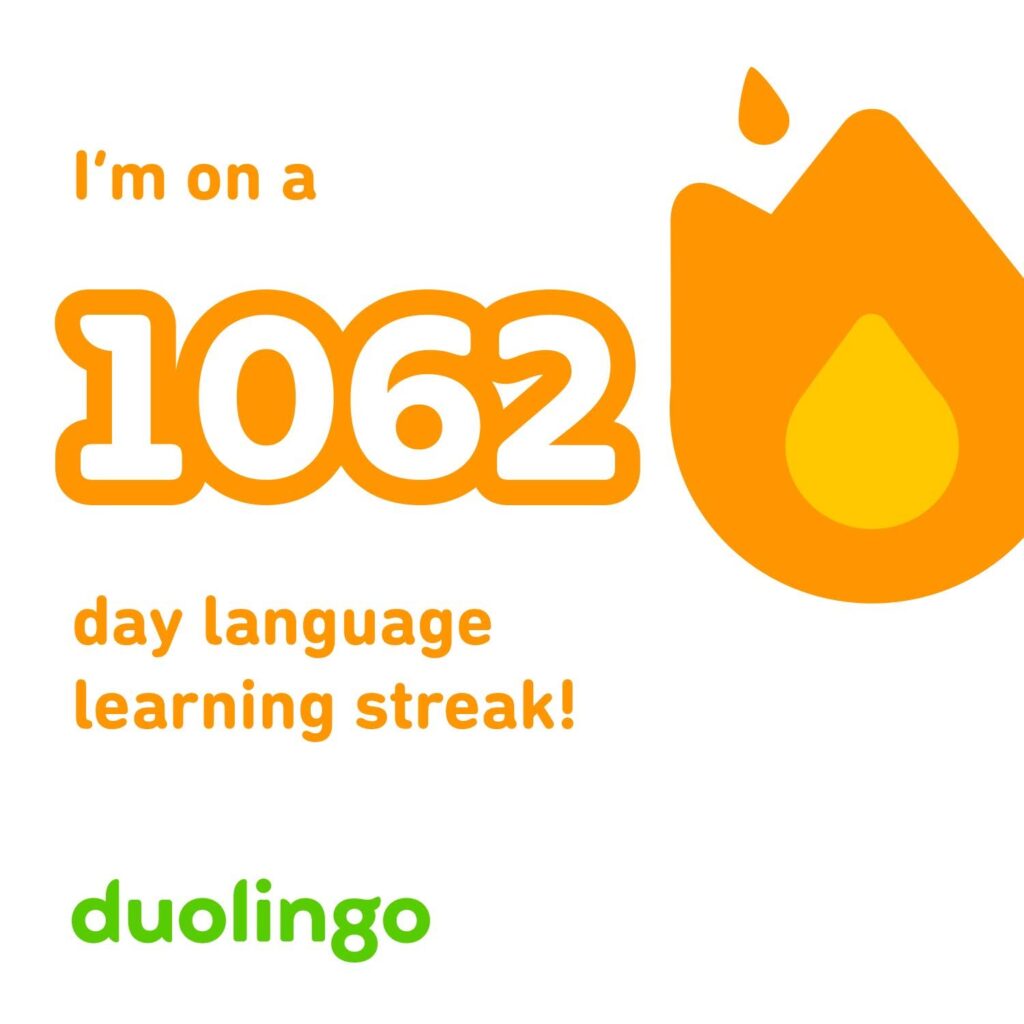
Even I am surprised at my persistence!
I’m still studying Japanese, but my lack of kanji memorization is slowing me down, and I haven’t been making the flash cards from my notes to get to the level I need to be at. But I’m not giving up, either…
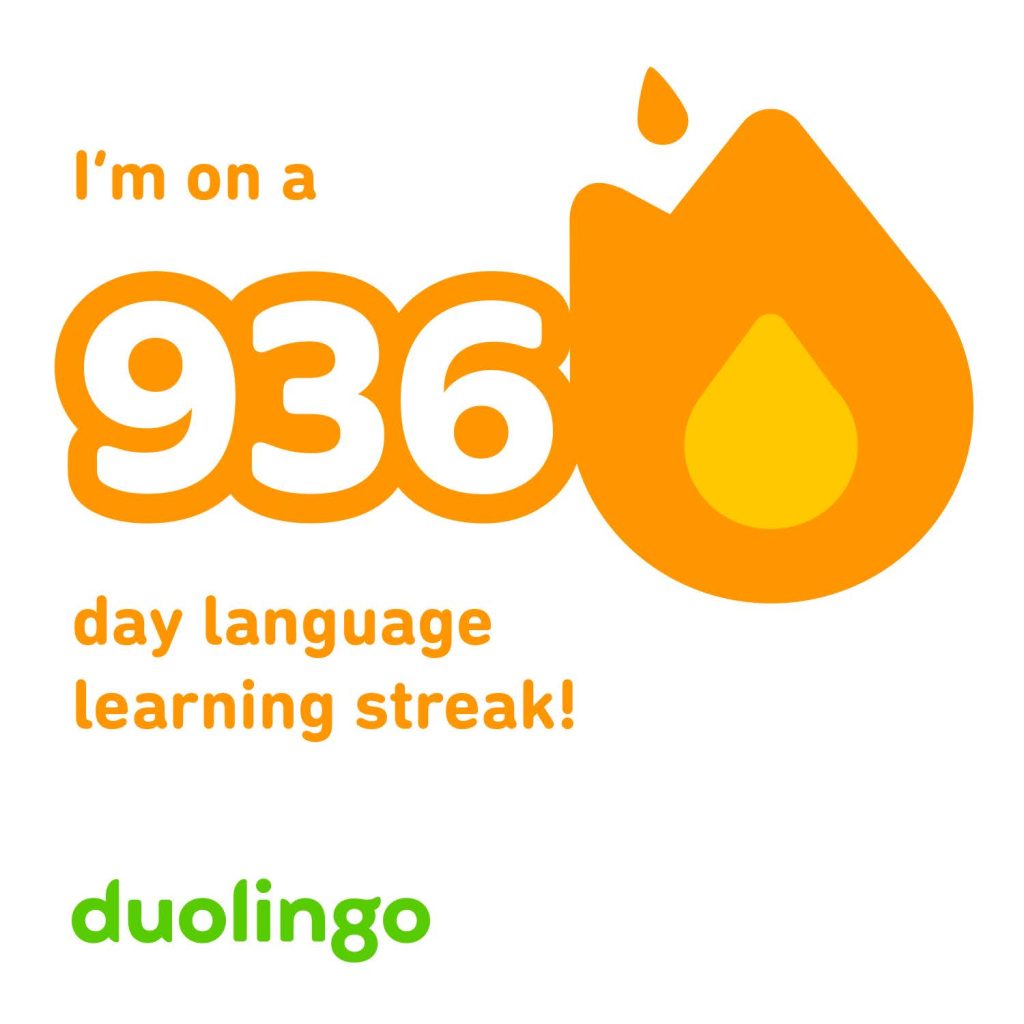
And Duolingo gives me a chance to brag about it EVERY SINGLE DAY! (Well, every day I study, which is the same thing.)
Also, if I haven’t mentioned this since switching from other languages to Japanese: Japanese is difficult for me! My reaction when the program shows me an exercise is:
I’m still struggling so much over the little connectors, like [o], [ni], and [te/de]. I still fail to see the pattern of when they are appropriate, but… hopefully I’ll get there.
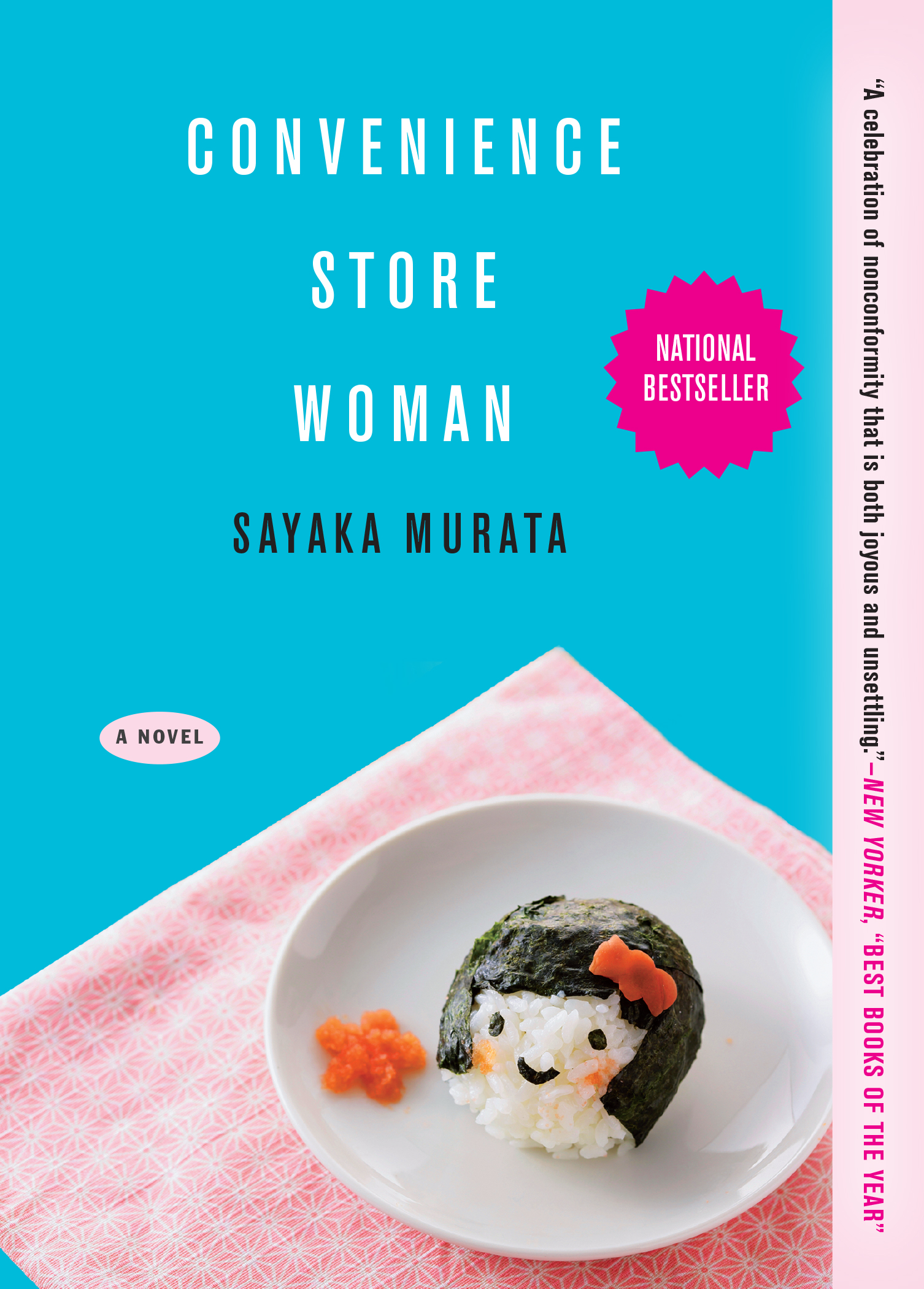
Convenience Store Woman
by Sayaka Murata
translated by Ginny Tapley Takemori
published in English by Grove Press (Grove Atlantic)
2016 (Japanese) / 2018 (English)
This is a compact, engrossing novel about a woman who has never quite fit into the rigid expectations of her family or society.
While convinced she is quite logical, Keiko sees that her behavior creates distress, especially for her beloved younger sister. Keiko learns to adjust her public self by mimicking those around her – their mannerisms, accents, clothing choices, figures of speech… And everyone seems satisfied and a bit flattered by how well she fits in – up to a point. Her continued work in a Japanese convenience store and single status remain unacceptable, though both suit her.
Ultimately, to appease her sister and others, she announces the end of her single status. The absurdity of misplaced satisfaction of those around her comes into the starkest possible relief.
The reviews I’ve read of this book discuss how “quirky” and “eccentric” the lead character is, but I suspect more. Those of us with friends ‘on the spectrum’ may read more into her viewpoints, and see Keiko as advocating for the liberation of neurodivergent people on their own terms.
It’s a great, short novel, and I love the frequency in which variations of ‘unnerving’ or ‘unsettling’ come up in the reviews!

I continue to recommend this app/website/team for your language practice adventures.
Most of my Duolingo practice days have been devoted to refreshing my German, but I have also been using the Japanese course (which I’ve already gushed about).
One thing I especially need is writing practice, so my Japanese notes will be more legible. For this, I’ve recently started using the downloadable writing practice sheets at japanese-lesson.com. I also have a brush pen, which should help with some of the subtle points, curves, and flourishes on the characters, if I ever get good enough to include them!
The site includes writing practice sheets for Hiragana, Katakana, and Kanji. (I’m providing a link to the Hiragana page, but you can easily navigate to the others.)

Studying a language for fun at your own pace is a great thing. It’s great that it is possible, and that so many people are working hard to make studying fun!

Having been unable to travel for so long due to the COVID-19 pandemic, I have a wicked case of wanderlust.
Some of my wanderlust is just caused by escapism: I’m dealing with lots of dull obligations, so the appeal of being AWAY is as alluring as the idea of specific places I may enjoy! I know myself well enough to recognize this, and am evaluating my fantasies carefully, to see what they are REALLY about.
As part of thinking about why I travel, I’ve been reading my writing about past trips, from my first, solo, trans-Pacific trip (to Japan) to my more recent writing about my taxing, trans-Atlantic business travel, where I was able to convey both the hardships AND the glamour.
That first solo trip was an amazing experience, but writing about it while I was sick with a persistent case of bronchitis skewed my reporting. Writing to friends who didn’t share my interests in art narrowed it further. I managed to convey the difficulties well, but not the gorgeousness of misty paths leading to ancient shrines in wet, shady forests, or the beauty of clouds clinging to mountain tops, or the satisfaction of soaking in deeply sulfurous waters… While my friends (fairly) interpreted my writing as disappointment, and I did describe negative experiences and states of mind, I still enjoy memories from that trip: of oversized leaves that fell so noisily while I sat in a forest, lush carpets of moss in a chess-board-like temple garden with stone lanterns as chess pieces, the unexpected appeal of my German hiking companion as he boarded his departing train, the hot lemon drink that warmed me when I was rain-drenched, the bliss of soaking up to my neck in deep hostel bathtubs that I didn’t describe…
The frustrations of the noisy crowds and the jostling students are also vivid, but are less important now: that wasn’t my only trip to Japan, that wasn’t my only visit to those sites in Kyoto, and my subsequent experiences at popular tourist sites mean I understand the limits of what they can and can’t offer me in a way I didn’t at the time.
That trip helped me see and accept what popular mass tourism is. I accept that there are lists of “must-see” destinations (which I don’t actually have to see), and that some of those destinations may be worthwhile if I am willing to accept the consequences of their popularity. (This has also led to my intentional photo series of tourists taking photos at crowded sites, which I enjoy making, and which are only possible due to the nature of such sites.) Accepting this helps me make more informed choices about opting-in AND opting-out. I freely do both.
*
My business travel was also highly educational. Being overseas as part of an initial team that dispersed at the end of the business day/week, leaving me unexpectedly alone in a new place, I had to orient myself, and then decided to use my newfound knowledge to orient others. I recognized and appreciated the collegiality of someone with more experience there, and ensured I repaid that collegiality when our project changed sites, and that I followed his example in general. I knew what kinds of social and logistical support I had wanted, and I provided that to those who followed.
I gave tours, and took newcomers to my favorite spots if they shared my interests; I wrote a brief visitors guide; I recommended restaurants, dishes, beer, museums, hotels; I met up for meals with colleagues who didn’t want to dine alone; I translated; I learned train lines, bought tickets, and guided colleagues to work, and in doing so, expanded the practical hotel range for a suburban office with a limited pool of hotels, so my colleagues could spend time in a world-class city rather than sit in a remote, rural hotel at night; I took colleagues on field trips… That felt GREAT! I felt useful, I made things easier, I enjoyed good company, I had good fun.
With multi-country business trips that spanned several weekends, I had a chance to learn about different approaches to exploring: about how to use hotels (the sort that are too cramped to linger in, and the sort that are a pleasure and destination of their own); how to pace myself based on my energy levels, moods, and the weather; how to go away for a weekend; and how to stay put.
Both on business and on my vacations, I learned about the complexity of traveling with others. Of how the wrong traveling companions complicate a trip, and the right ones make my experience of a destination better than I could have managed on my own. This last point is the best lesson: I do have a few friends whose company is great ON THE MOVE, and I should experience places with them more often!
I’ll now return to my daydreams (and online research and list-making) of safe and enjoyable travel, with expectations well grounded by my actual travel experiences…
I mentioned before that I don’t write about EVERYTHING I read recreationally, because I don’t strongly recommend everything I read. I wouldn’t feel great about spending my time dwelling on things I didn’t enjoy.
There’s a web comic site that’s been advertising on Twitter, and I eventually caved and logged in to see what they have. Their ads are promoting a tale about an abused, sheltered heroine who was married off to an ab-heavy giant who doesn’t communicate well. She is terrified by everything and requires constant rescue. That is… NOT my cup of tea – I love competence (though I’ll settle for high spirits or a good attitude). The drawings are cute, but you will not read about that here.
Likewise, there’s a well-drawn manga I’ve never mentioned here, which packed the first collection I bought with adventure, but… the story got derailed somewhere in the second collection by the artist’s obsession with looking up all the girls’ skirts and gratuitous shower scenes. Later chapters seem to be mostly shower scenes? I know the conventions of awkward falling and “it’s not what you think” physical humor, and I have laughed at good versions of that (it’s possible!), but this one is just about drawing girls’ private parts now. I’ve given up, won’t buy more, etc.
It’s still fun to write about books and stories that impress me, so I’ll stick to that! 🙂

Yes, for some of us, nearly every day is World Postcard Day, thanks to the hard work of our postal services! There is also a SPECIAL day for those of us who aren’t already sending and receiving them regularly! The winning design for the card this year is cute, and everyone likes to receive a note in the mail. Try it!